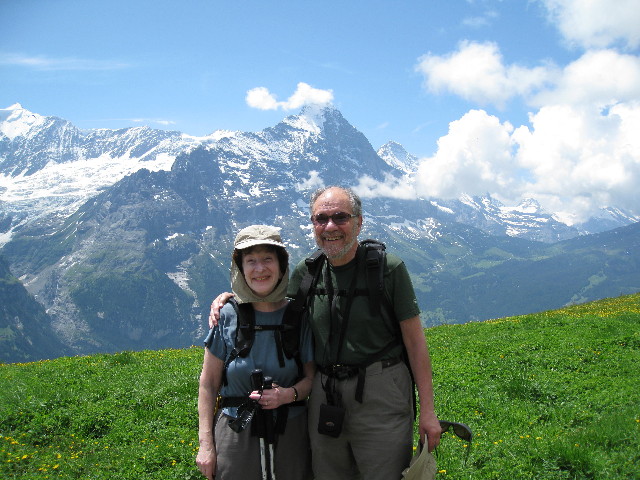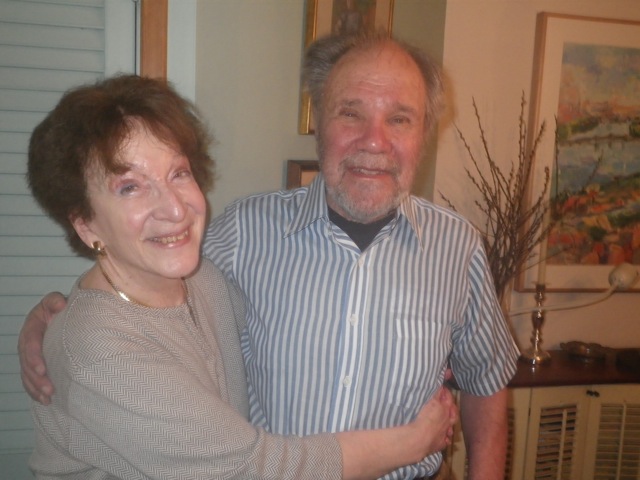Prof. Aron Bernstein Nuclear Disarmament Memorial

In a long and productive life in nuclear physics, Aron was an unflagging advocate for peace and nuclear disarmament, particularly among his scientific colleagues. This page will carry reports, articles, curricula and other projects and initiatives related to his priorities working for peace and nuclear disarmament.
Along with other colleagues, Aron founded the MIT Nuclear Weapons Education Project (NWEP). The idea was to provide important technical and historical information concerning nuclear weapons development and issues, with the ultimate goal of bringing the existential threat posed by nuclear weapons to the attention of younger people who did not grow up during the Cold War and who thus are relatively unaware of the threat. The focus of the project is a website (nuclearweaponsedproj.mit.edu) that contains a large amount of information as well as the opportunity to simulate different types of nuclear weapons use and their expected results. The website is especially aimed at educators who can then bring such issues to the attention of their students. The website continues to receive large numbers of hits and requests and it is maintained on a regular basis.
“Reducing the Nation’s Spending for Nuclear Weapons” Saturday, January 25, 2025, 2:00 – 5:30 PM (EST) A Virtual Conference
Open letter to Science magazine
Uphold the nuclear weapons test moratorium
Dear Colleagues,
The Trump administration is considering renewing nuclear weapons testing((J. Hudson, P. Sonne, “Trump administration dis-cussed conducting first U.S. nuclear test in decades,” The Washington Post (2020).)), a move that could increase the danger of another nuclear arms race as well as an inadvertent or intentional nuclear war. Following in the long tradition of scientists opposing nuclear weapons due to their harmful effects on both humanity and the planet1, we ask the U.S. government to desist from plans to conduct nuclear tests.
During the Cold War, the United States conducted 1030 nuclear weapons tests, more than all other nuclear-armed nations combined2. In 1996, the United States signed the Comprehensive Test Ban Treaty (CTBT), agreeing not to conduct a nuclear weapons test of any yield3. The United States has not yet ratified the CTBT but did spearhead the 2016 adoption of UN Security Council Resolution 2310, which calls upon all countries to uphold the object and purpose of the CTBT by not conducting nuclear tests4.
Eight of the nine nuclear-armed states, including the five permanent members of the UN Security Council, have observed a moratorium on nuclear testing since 199823. The ninth, North Korea, responding to international pressure, stopped testing war-head detonations (as opposed to missile flights) in 20175. If the United States ratified the CTBT, joining the 168 countries who have already done so3, there is a good chance that the other holdout countries would ratify the treaty as well6.
In contrast, restarting U.S. nuclear weapons tests of any size, underground or above-ground, would give license to other countries, such as North Korea, India, and Pakistan, to resume testing. If the tests are underground, radioactive materials could leak into the local environment, including water supplies7. If in the atmosphere, which is currently prohibited by the 1963 atmospheric test ban treaty8, such tests would spread radioactivity, sometimes very widely7.
Once the United States breaches the treaty, there will be no way to prevent other nations from carrying out tests of larger warheads or to control leaks into the environment and atmosphere. Even a “limited” nuclear exchange between nuclear-armed nations can cause untold local death and destruction, as well as global climate and agricultural catastrophes stemming from the climate impacts of smoke from fires ignited by nuclear weapons9.
The current U.S. arsenal includes thousands of warheads, together capable of obliterating every major city in any country on Earth. Yet the United States has embarked on a $1.7 trillion nuclear weapons enhancement program10, of which the proposed testing would be one small—but dangerous—component. All nations, including the United States, should to continue to reduce the number of nuclear warheads in the world’s arsenals, not increase their efficacy or develop more lethal versions.
Senator Ed Markey has recently introduced the Preserving Leadership Against Nuclear Explosives Testing (PLANET) Act, which would deny funding for and thereby prevent the renewal of testing11.
We urge the Senate to pass this bill and to ratify the CTBT immediately.
Co-authors of Open Letter to the Scientific Community:
The US Must Not Break the Nuclear Weapons Test Moratorium
Jonathan King (Professor of Molecular Biology, MIT, Cambridge, MA).
Martin Chalfie, (Nobel Prize in Chemistry, 2008, University Professor, Department of Biological Sciences, Columbia University NY, 10027, USA) .
Noam Chomsky (Institute Professor emeritus MIT; Professor of Linguistics, University of Arizona, Tucson, AZ).
Joseph Cirincione (President, Ploughshares Fund, Washington, DC).
Sean Decatur (President, Kenyon College, Gambier, OH)
Melissa Franklin (Mallinckdrodt Professor of Physics, Harvard University, Cambridge, MA).
Sheldon Lee Glashow (Nobel Prize in Physics 1979, Metcalf Prof. of Mathematics and Physics, Boston University, Boston, MA)
David P. Goldenberg (Professor of Biology, University of Utah, Salt Lake City, UT).
Gary Goldstein (Professor of Physics, Tufts University, Medford, MA).
Ira Helfand, MD (Member International Steering Group, ICAN, the recipient of the 2017 Nobel Peace Prize).
Daniel Holz (Department of Astronomy & Astrophysics, and Kavli Institute for Cosmological Physics, University of Chicago, Chicago, IL 60637
Peter C. Kahn (Professor of Biochemistry, Department of Biochemistry & Microbiology, Rutgers University, New Brunswick, NJ ).
Sheldon Krimsky (Lenore Stern Professor of Humanities & Social Sciences; Adjunct Professor Public Health & Community Medicine, Tufts University, Medford, MA).
Stuart A. Newman (Professor of Cell Biology & Anatomy, New York Medical College, Valhalla, NY)
Prasannan Parthasarathi (Professor of History, Boston College, Chestnut Hill, MA).
William Philips, (Nobel Prize in Chemistry, 2008, College Park, MD, 20740, USA)
Robert P. Redwine (Professor of Physics, Massachusetts Institute of Technology Cambridge, MA).
Sir Richard J. Roberts Ph.D. F.R.S.,(1993 Nobel Laureate in Physiology or Medicine, Chief Scientific Officer, New England Biolabs, Ipswich, MA 01938-2723 USA)
Alan Robock, (Distinguished Professor of Climate Science, Rutgers University, New Brunswick, New Jersey).
Catherine Ann Royer (Professor of Chemistry and Chemical Biology, Rensselaer Polytechnic Institute, Troy NY 12180).
Suzanne Scarlata (Whitcomb Chair of Biochemistry, Worcester Polytechnic Institute, Worcester, MA).
Elaine Scarry (Cabot Professor of Aesthetics, Harvard University, Cambridge, MA).
Susan Solomon (Martin Professor of Environmental Studies, MIT, Cambridge, MA).
Andrew Strominger (Gwill E. York Professor of Physics, Harvard University, Cambridge MA).
Eric J. Sundberg, (Professor and Chair of Biochemistry, Emory University School of Medicine, Atlanta, GA)
Robert Socolow (Professor emeritus, Department of Mechanical and Aerospace Engineering, Princeton University, Princeton, NJ).
George F. Smoot, 2006 Nobel Prize for Physics, Helmut and Anna Pao Sohmen Professor at Large, Hong Kong University of Science and Technology, Kowloon, Hong Kong

- J. C. Jolly, Endeavor 26, 149 (2002). [↩]
- Arms Control Association, The Nuclear Testing Tally (2019); www.armscontrol.org/factsheets/nucleartesttally [↩] [↩]
- Comprehensive Nuclear-Test-Ban Treaty (CTBT) (2020); https://www.nti.org/learn/treaties-and-regimes/comprehensive-nuclear-test-ban-treaty-ctbt/ [↩] [↩] [↩]
- Arms Control Association, UN Security Council Backs CTBT (2016); www.armscontrol.org/ACT/2016_10/News/UN-Security-Council-Backs-CTBT. [↩]
- Arms Control Association, Chronology of U.S.-North Korean Nuclear and Missile Diplomacy (2020); www.armscontrol.org/factsheets/dprkchron. [↩]
- D. Choubey, “The CTBT’s importance for U.S. national security” (Carnegie Endowment for International Peace, 2009). [↩]
- Comprehensive Nuclear-Test-Ban Treaty Organization, General Overview of the Effects of Nuclear Testing (www.ctbto.org/nuclear-testing/the-effects-of-nuclear-testing/general-ove…). [↩] [↩]
- John F. Kennedy Presidential Library and Museum, Nuclear Test Ban Treaty (www.jfklibrary.org/learn/about-jfk/jfk-in-history/nuclear-test-ban-treaty). [↩]
- A. Witze, Nature 579, 485 (2020). [↩]
- Arms Control Association, U.S. Nuclear Modernization Programs (2018); www.armscontrol.org/factsheets/USNuclearModernization. [↩]
- Ed Markey, U.S. Senator for Massachusetts, “Senator Markey, Senate colleagues announce legislation to prohibit restart of U.S. nuclear weapons testing” (2020). [↩]

